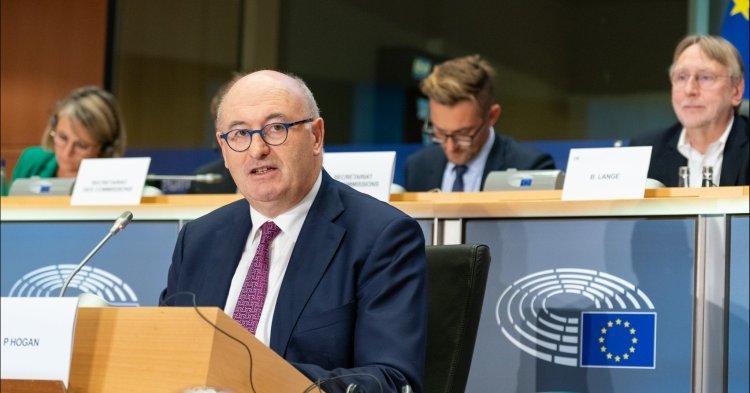The problem with Phil Hogan’s Resignation as Commissioner for Trade
Political controversies often stem from the most unlikely of places, and that which led to Hogan’s departure was no different. On August 19, at a nondescript hotel in the town of Clifden on Ireland’s west coast, the Oireachtas (parliamentary) Golf Society hosted a dinner for 81 guests, including a number of high-profile figures from Irish public life.
The event was held just one day after the Irish government tightened Covid-19 restrictions, reducing the permissible numbers for indoor gatherings from 50 to six, with some limited exceptions. A public health notice at the Station House Hotel in Clifden stipulated that “no formal or informal events or parties should be organised in these premises”.
As the story broke in the Irish press the following day, a wave of public anger swept the nation at what many perceived to be a political elite flouting lockdown regulations.
For a government barely two months into its mandate and already marred in scandal, there was only one possible option to mollify the public sentiment: heads would have to roll. The Taoiseach (Prime Minister) requested the resignations of senior politicians in attendance at the event. However, the measures failed to quell the public anger, which threatened to thrust the government into crisis.
Attention turned to Hogan’s attendance at the Golf Society dinner and his movements while in Ireland, which revealed that he had failed to quarantine for the mandatory 14 days subsequent to his arrival from Brussels. The Commissioner explained unconvincingly, that after a Covid test returned negative, he believed himself to be exempt from quarantine rules. In a desperate attempt to end the interminable controversy, the Taoiseach asked Hogan to “consider his position” as the EU Commissioner for Trade.
Such a request is highly unusual and highly problematic. Members of the European Commission, while appointed by their national governments, are not answerable to their Member States; they represent the interests of all EU citizens and cannot be removed from office by the government which appointed them. Article 245 TFEU requires that “Member States shall respect [Commissioners’] independence and shall not seek to influence them in the performance of their tasks”.
The essential question to be asked therefore, is whether the government of any other Member State would have called for Hogan’s resignation had he breached lockdown regulations in their jurisdiction, or indeed whether the Irish government would have forced the resignation of any other Member of the Commission if s/he had taken Hogan’s place at the Oireachtas Golf Society dinner. If these questions are answered in the negative, then the actions of the Irish government must be termed as interference in the independence of a Commissioner in the performance of his duties, and consequently as a violation of an essential tenet of EU institutional law.
This leads to the second, and deeply ironic problem with Hogan’s departure: the European Commission persistently refers to itself as the “guardian of the Treaties”, and yet its President wilfully allowed Hogan to be pressured by the Irish government into resignation, contrary to Article 245 TFEU.
Furthermore, according to Article 247 TFEU there are only two limited circumstances in which a Commissioner will be compelled to resign: firstly, where s/he “no longer fulfils the conditions required for the performance of his duties”, or secondly, where s/he “has been guilty of serious misconduct”.
It is extremely unlikely that Hogan’s behaviour would meet these thresholds. Rather than accepting her Commissioner’s resignation, von der Leyen should have submitted the case for consideration by the Commission’s Independent Ethics Committee in order to determine whether Hogan’s actions fell foul of the criteria outlined by Article 247 TFEU.
Alternatively, she could have brought the matter before a full sitting of the European Commission for a vote to be held on the compatibility of Hogan’s actions with Article 247 TFEU. If a simple majority were to be in favour of the Commissioner’s removal, the question of Hogan’s compulsory retirement would have been brought before the Court of Justice.
President von der Leyen failed in her duty to safeguard due process according to Article 247 TFEU and the independence of her Commissioners in the performance of their duties in accordance with Article 245 TFEU.
A damaging legacy for the Irish government and the European Commission
Mairead McGuinness will be a predictable and reliable Member of the European Commission. She has a deep understanding of EU policy and is known for her warm and personable managerial style. Her appointment marks further progress towards gender balance of the Commission.
Nevertheless, there is no positive outcome for this scandal, which should have been confined to a purely domestic sphere. As a result of the misguided decisions made by the Taoiseach and Commission President, its consequences led to a reshuffle of what is probably the most important portfolio in the Commission as tensions in the negotiations on the future relationship between the EU and the UK reach a critical point.
More damaging still is the precedent established by Ireland in interfering in the internal affairs of the European Commission and indeed by von der Leyen’s reckless disregard for the Treaty provisions intended to shield Commissioners from external influence. This is the unfortunate legacy of ‘Golfgate’.


Follow the comments: |
|
